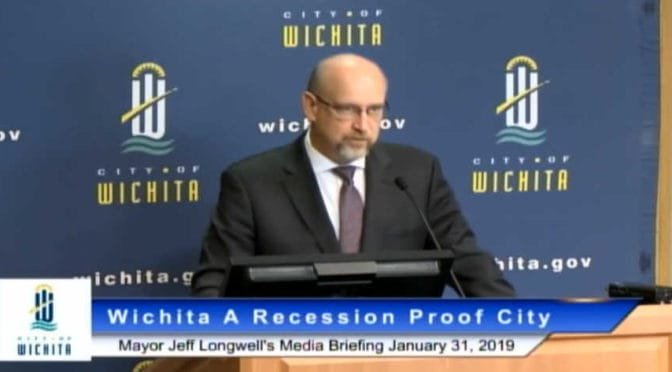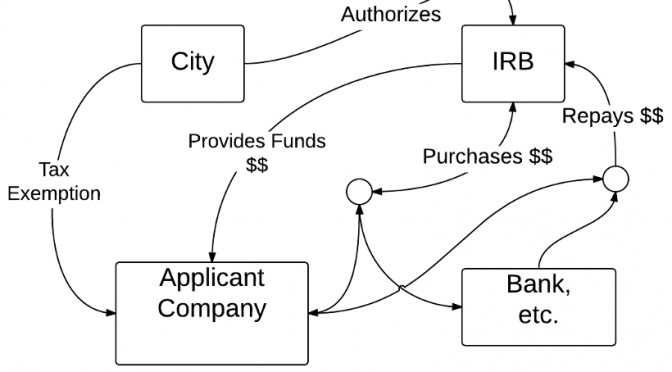Wichita city leaders will latch onto any good news, no matter from how flimsy the source. But they ignore the news they don’t like, even though it may come from the U.S. Census Bureau, U.S. Bureau of Labor Statistics, or U.S. Bureau of Economic Analysis.
 In his media briefing today, Wichita Mayor Jeff Longwell cited an article promoting the purportedly recession-proof and growing Wichita-area economy. 1
In his media briefing today, Wichita Mayor Jeff Longwell cited an article promoting the purportedly recession-proof and growing Wichita-area economy. 1
Based on the article 2 Longwell cited Wichita’s low unemployment rate and growing job count.
One quote from the article highlights Wichita’s low unemployment rate: “In 2018, the city saw unemployment fall to 3.5 percent — the lowest it’s been since May 1999.” Here’s some data regarding this claim:
 In the table, we see that the unemployment rate (monthly average) for 2018 is nearly unchanged from 1999. Also nearly unchanged for these 19 years are the civilian labor force and number of jobs. Both values are slightly lower now. This is not “steady job growth.”
In the table, we see that the unemployment rate (monthly average) for 2018 is nearly unchanged from 1999. Also nearly unchanged for these 19 years are the civilian labor force and number of jobs. Both values are slightly lower now. This is not “steady job growth.”
The article the mayor relies upon doesn’t reflect the economic reality in Wichita. It isn’t even close. Yet the mayor and other city officials have heavily promoted this article on social media.
Mayor Longwell also said, “We want to celebrate some of our successes because it has not been easy to get here and it’s been very intentional, and the things that we’re doing that help make Wichita a great place to live but more importantly a place where we can ride out a potential recession that may hit the rest of the country at some point in time and we think that’s a great place for us to be right now.”


That’s like two recessions in Wichita at a time the national economy was growing. Is that recession-proof?
 The mayor also presented a forecast that Wichita will add 2,700 jobs in 2019. The source of this forecast is the Center for Economic Development and Business Research at Wichita State University. 4
The mayor also presented a forecast that Wichita will add 2,700 jobs in 2019. The source of this forecast is the Center for Economic Development and Business Research at Wichita State University. 4
For the Wichita metropolitan area economy, adding 2,700 jobs in a year represents 0.9 percent job growth. Is that good? Nationally, the economy is expected to continue strong growth, although perhaps slightly slower than in 2018, in which nonfarm jobs grew by 1.8 percent. 5 Nationally, job growth is forecast at 1.7 percent for 2019. 6 Wichita’s forecast rate of 0.9 percent is 53 percent of the national rate — barely more than half.

The nearby chart illustrates that since the end of the last recession, job growth in Wichita has been below job growth in the nation as a whole. 7 Generally, job growth in Wichita has been at about half the rate of the nation. In 2017, Wichita lost jobs. Yet, City of Wichita officials tout “steady job growth.”
It’s not only jobs and output. Personal income has grown only slowly. 8
The Wichita metropolitan area population is growing, but at a rate slower than most metro areas. From 2010 to 2017, the Wichita metro area grew in population by 2.3 percent. For all U.S. metro areas, the population growth was 6.5 percent. Of the 382 metropolitan areas, Wichita ranked 245. Considering just the change from 2016 to 2017, Wichita’s population grew by 0.1 percent, ranking 268 of the 382 metro areas. All U.S. metro areas grew by 0.8 percent over the same period.
For net domestic migration, Wichita experienced a loss of 2.9 percent of its population from 2010 to 2017. This ranked 295 among metro areas. For 2016 to 2017, Wichita lost 0.5 percent, ranking 293, nearly unchanged from the larger earlier period. 9
This slow population growth and out-migration is happening at the same time Wichita-area leaders tell us that we have great momentum going forward. But the data — domestic migration, employment, gross domestic product, and personal income — don’t support what our leaders tell us.
—
Notes
- City of Wichita Mayor Jeff Longwell’s Media Briefing January 31, 2019. ↩
- Handy, Emily. The 7 Most Recession-Proof Cities in the US. Livability. January 22, 2019. Available at https://livability.com/topics/careers-opportunities/the-7-most-recession-proof-cities-in-the-us. ↩
- U.S. Bureau of Economic Analysis, Total Real Gross Domestic Product for Wichita, KS (MSA) RGMP48620, retrieved from FRED, Federal Reserve Bank of St. Louis; https://fred.stlouisfed.org/series/RGMP48620, January 31, 2019.
The All industry total includes all Private industries and Government. Real GDP by metropolitan area is an inflation-adjusted measure of each metropolitan area’s gross product that is based on national prices for the goods and services produced within the metropolitan area.
Also: U.S. Bureau of Economic Analysis, Real Gross Domestic Product GDPCA, retrieved from FRED, Federal Reserve Bank of St. Louis; https://fred.stlouisfed.org/series/GDPCA, January 31, 2019. ↩ - Center for Economic Development and Business Research at Wichita State University. Wichita Employment Forecast. January 8, 2019. Available at http://www.cedbr.org/forecast-blog/forecasts-wichita/1558-economic-outlook-wichita-2019-january-revision. ↩
- Minutes of the Federal Open Market Committee. December 18-19, 2018. Available at https://www.federalreserve.gov/monetarypolicy/fomcminutes20181219.htm. ↩
- Yandle, Bruce. Block out the noise: Here’s the 2019 economic outlook. Available at https://www.washingtonexaminer.com/opinion/block-out-the-noise-heres-the-2019-economic-outlook. ↩
- Weeks, Bob. Wichita employment to grow in 2019. Available at https://wichitaliberty.org/economics/wichita-employment-to-grow-in-2019/. ↩
- “For all metropolitan areas in the United States, personal income rose by 4.5 percent. For the Wichita metro area, the increase was 2.3 percent. Of 383 metropolitan areas, Wichita’s growth rate was at position 342.” Weeks, Bob. Personal income in Wichita rises, but slowly. Available at https://wichitaliberty.org/economics/personal-income-in-wichita-rises-but-slowly/. ↩
- Weeks, Bob. Wichita migration not improving. Available at https://wichitaliberty.org/economics/wichita-migration-not-improving/. ↩








